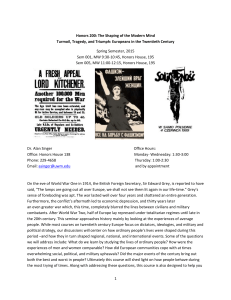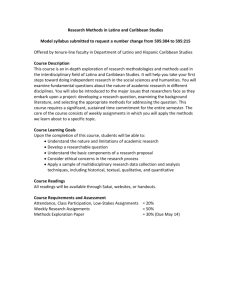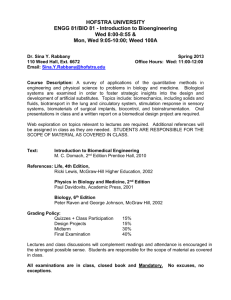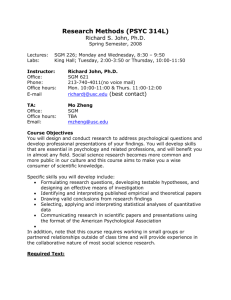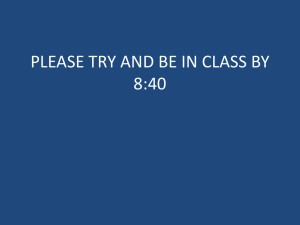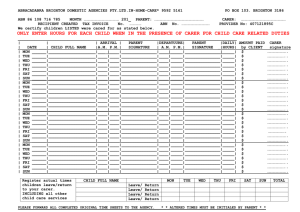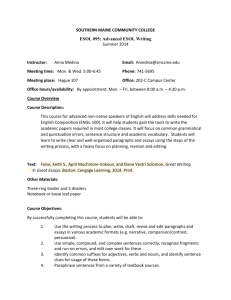Honors 200: The Shaping of the Modern Mind Turmoil, Tragedy, and
advertisement
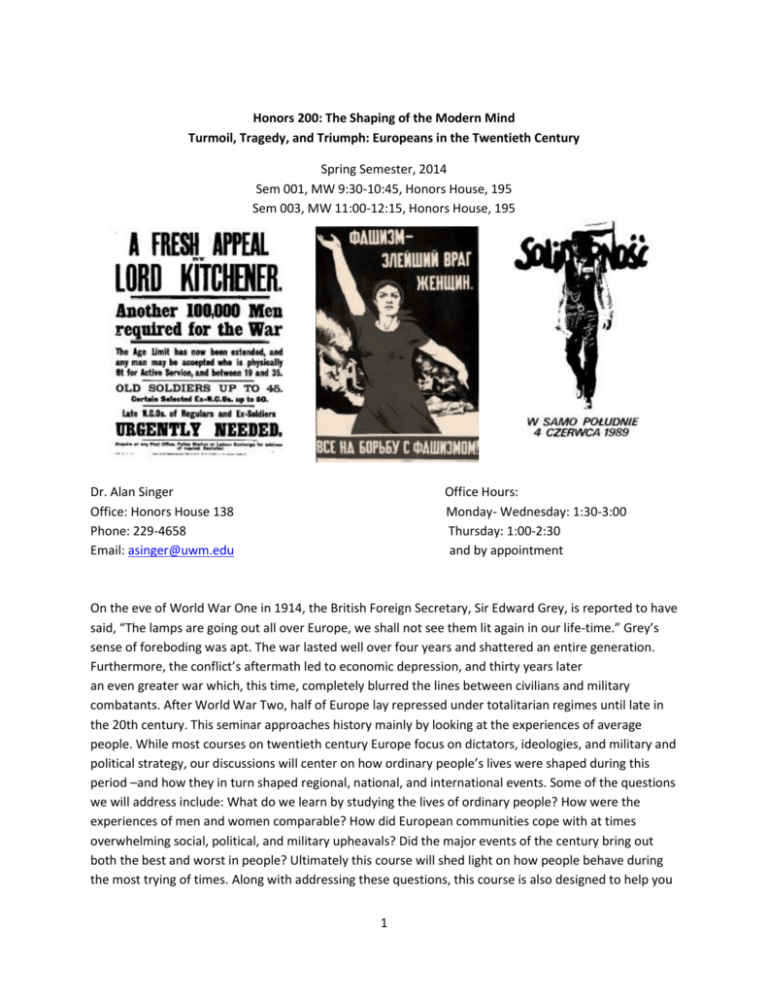
Honors 200: The Shaping of the Modern Mind Turmoil, Tragedy, and Triumph: Europeans in the Twentieth Century Spring Semester, 2014 Sem 001, MW 9:30-10:45, Honors House, 195 Sem 003, MW 11:00-12:15, Honors House, 195 Dr. Alan Singer Office: Honors House 138 Phone: 229-4658 Email: asinger@uwm.edu Office Hours: Monday- Wednesday: 1:30-3:00 Thursday: 1:00-2:30 and by appointment On the eve of World War One in 1914, the British Foreign Secretary, Sir Edward Grey, is reported to have said, “The lamps are going out all over Europe, we shall not see them lit again in our life-time.” Grey’s sense of foreboding was apt. The war lasted well over four years and shattered an entire generation. Furthermore, the conflict’s aftermath led to economic depression, and thirty years later an even greater war which, this time, completely blurred the lines between civilians and military combatants. After World War Two, half of Europe lay repressed under totalitarian regimes until late in the 20th century. This seminar approaches history mainly by looking at the experiences of average people. While most courses on twentieth century Europe focus on dictators, ideologies, and military and political strategy, our discussions will center on how ordinary people’s lives were shaped during this period –and how they in turn shaped regional, national, and international events. Some of the questions we will address include: What do we learn by studying the lives of ordinary people? How were the experiences of men and women comparable? How did European communities cope with at times overwhelming social, political, and military upheavals? Did the major events of the century bring out both the best and worst in people? Ultimately this course will shed light on how people behave during the most trying of times. Along with addressing these questions, this course is also designed to help you 1 develop the necessary skills that will help you become a more active reader, listener, speaker, and a more effective writer. Required Readings: Vera Brittain, Testament of Youth (the appropriate excerpts are available in a printed course pack from Clark Graphics, 2915 North Oakland Ave) Richard Stites, Revolutionary Dreams: Utopian Vision and Experimental Life in the Russian Revolution (ISBN-13: 978-0195055375) Jan T. Gross, Neighbors: The Destruction of the Jewish Community of Jedwabne Poland (ISBN-13: 978-0142002407) Slavenka Drakulic, How We Survived Communism and Even Laughed (ISBN-13: 978-0060975401) Timothy Garton Ash, The Magic Lantern: The Revolution of ’89 Witnessed in Warsaw, Budapest, Berlin and Prague (ISBN-13: 978-0679740483) Required Viewing: Europa, Europa, dir. Agnieszka Holland, 1990 Course Requirements: Your final grade will be based on the work you do in three areas. First, there will be three, five page to seven page essays. In these assignments you will be asked to write on important issues relating to the readings from the schedule below. In the second type of assignment, you will write three, two to three page essays that answer specific questions regarding the readings or discussions. The questions will be designed to help you focus on the material as the semester progresses. The third area of evaluation regards class participation. Since this course is in a seminar format, it is absolutely essential that there is positive discussion throughout the semester. To ensure this, you are required to take part. *A note on “positive discussion”: Ideally, in a seminar, the students do most of the talking. My main job is to direct discussion in a manner so we stay on topic. Because the course is essentially a semester-long conversation, sometimes concerning controversial issues, we all have to make sure that we respect each other. We all come into the seminar room with a variety of life experiences and backgrounds, opinions, political and religious beliefs, etc. The seminar itself and consequentially, your grades will greatly suffer if courtesy and sensitivity towards your fellow classmates are not observed. D2L We will be using D2L, the online course management program. A couple of days before each class, I will be posting questions and key terms which you should consider and be familiar with when you come in. This will greatly help our discussions and your understanding of the reading material. I will also be occasionally posting announcements about any possible changes in our schedule and any other relevant news for the class. On occasion, I will also be posting links to relevant supplementary material that is available online. Let me know if you have any questions about logging into D2L. 2 Grade Breakdown: Paper One: 20% Paper Two: 20% Paper Three: 25% Two to three page assignments: 15% Participation (attendance, punctuality, positive discussion) 20% A note on attendance and punctuality: Because this course is in seminar format, where you are expected to play an active part, you are required to attend classes and be on time. I will be taking attendance and noting tardiness. If you know ahead of time that you will be absent or late, be sure to email me and let me know. As you will see on the schedule below, on two occasions we will be holding required, individual meetings to discuss drafts and outlines of the longer paper assignments. Evaluation Scale: You will receive a percentage grade for all of your assignments. I will be using a basic plus/minus scale: A 93-100 A- 90-92 B+ 88-89 B 83-87 B- 80-82 C+ 78-79 C 73-77 C- 70-72 D 60-70 Email: Students must check their UWM email often. Along with D2L, we will use email as a primary means of communication outside of class. Policies: Attendance: Missing class more than two times because of unexcused absences will result in losing 5 points from one’s final grade for each additional absence. Tardiness: It is essential that you come to class on time. Please let me know ahead of time if you know you will be late. Excessive tardiness (more than two times) will result in losing 3 points from one’s final grade for each additional day that you are late. Late assignments: Unexcused late assignments will lose 5 points for every twenty-four hours they are late. Paper writing format: In this course, we will be using Chicago Manual of Style format. I will discuss the guidelines in class but you can also consult the relevant web sites for examples of how to do endnotes, a title page, works cited page, etc. Improper formatting will result in the lowering of your paper grade. Schedule: The following schedule lists what you should have read for each class discussion and when the five to seven page writing assignments will be due. Please note that this is a preliminary schedule. I may have 3 to move some things back if we need more time to discuss a given topic. I will be sure to give you fair notice if any dates change. Notice that on a number of days, I have listed “background information” under “Discuss”. I have done this on days that new topics are being addressed. You should look up these subjects (World War One, Russian Revolution, etc.) on your own, take some notes, and bring them to class. Just try to get a general idea of each term. This will greatly help our discussions when we talk about the assigned readings. When looking up these terms, try to use sources other than Wikipedia. We will discuss reputable websites in class. Wed. Jan. 22 Course introduction Mon. Jan 27 Discussion on reading and writing history Wed. Jan. 29 World War One Discuss: background information Vera Brittain, Testament of Youth excerpt, 94-134 Mon. Feb. 3 World War One Discuss: Brittain, 135-173 Wed. Feb. 5 World War One Discuss: Brittain, 173-204 Mon. Feb. 10 The Russian Revolutions Discuss: background information Richard Stites, Revolutionary Dreams, 1-36 Wed. Feb. 12 The Russian Revolutions Discuss: Stites, 37-57 Mon. Feb. 17 The Russian Revolutions Discuss: Stites, 61-100 Wed. Feb. 19 The Russian Revolutions Discuss: Stites, 100-123 Mon. Feb. 24 The Russian Revolutions Discuss: Stites, 124-189 Wed. Feb. 26 The Russian Revolutions Discuss: Stites, 190-222 Mon. Mar. 3 The Russian Revolutions and introductory discussion of Europa, Europa film Discuss: Stites, 228-253 Wed. Mar. 5 No class, individual meetings on Tuesday, Wednesday, and Thursday of this week. Mon. Mar. 10 World War Two – Film: Europa, Europa Discuss: background information 4 Begin reading Neighbors ( we will start our discussion of this book on the Monday after break) Wed. Mar. 12 World War Two- Film: Europa, Europa continue reading Neighbors *First 5-7 page essay due ********************************Spring Break****************************************** Mon. Mar. 24 World War Two Discuss: Jan Gross, Neighbors, 1-65 Wed. Mar. 26 World War Two Discuss: Gross, 66-124 Mon. Mar. 31 Living behind the Iron Curtain Discuss: background information Slavenka Drakulic, How We Survived Communism and even Laughed, xi-42 Wed. Apr. 2 Living behind the Iron Curtain Discuss: Drakulic, 43-92 Mon. Apr. 7 No class, individual meetings on Monday, Tuesday, and Wednesday of this week. Wed. Apr. 9 Living behind the Iron Curtain Discuss: Drakulic, 93-122 Mon. Apr. 14 Living behind the Iron Curtain Discuss: Drakulic, 123-168 *Second 5-7 page essay due Wed. Apr. 16 Living behind the Iron Curtain Discuss: 169-197 Mon. Apr. 21 The end of Communism in Europe Discuss: Timothy Garton Ash, The Magic Lantern, 11-46 Wed. Apr. 23 The end of Communism in Europe Discuss: Ash, 47-77 Mon. Apr. 28 The end of Communism in Europe Discuss: Ash, 78-112 Wed. Apr. 30 The end of Communism in Europe Discuss: Ash, 112-130 Mon. May 5 The end of Communism in Europe 5 Discuss: Ash, 130-153 Wed. May 7 The end of Communism in Europe Final discussion If your class was at 9:30, your final paper will be due on Wed. May 14, by noon, in my office. If your class was at 11:00, your final paper will be due on Mon. May 12, by noon, in my office. Your paper must be in on time. If it is late, I will deduct half of a grade for every half hour it is late. 6


